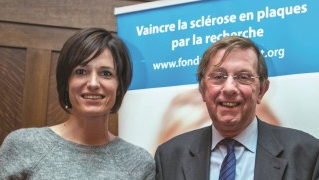A world first in MS research

Photo: Prof. N. Cools and Prof. C. Sindic, president of the Belgian Charcot Foundation - le Fonds Charcot 2017
The study is conducted by the Centrum voor Celtherapie en Regeneratieve Geneeskunde (CCRG), based on the UZA campus, and the Universiteit Antwerpen, with the support of the Belgian Charcot Foundation for pre-clinical basic research and the support of IWT (Instituut voor Innovatie door Wetenschap en Technologie) for the implementation of the first clinical study.
“In healthcare, one of the newest and most promising treatment methods is cell therapy, which is the use of the patient's own cells to treat the patient. These cellular modifications for medical purposes intervene directly in the pathological processes at the base of the disease. For autoimmune diseases such as MS, cell therapy can lead to a real breakthrough in treatments,” explains Nathalie Cools, assistant professor and 2017 recipient of the Charcot Fund.
This so-called “safety” clinical study is the first step in the development of a genuine treatment for MS patients. It will offer them the prospect of a new future without further deterioration of the nervous system. The researchers received financial support “IWT-TBM project” to be able to carry out the clinical study, as the industry is not yet investing in this type of clinical trial. The pre-clinical fundamental research that allowed this advance was funded by the Charcot Foundation, which for 30 years has been at the forefront of the fight against multiple sclerosis in Belgium.
“This stage of research confirms the innovative, excellent work that our researchers in Belgium provide, but also the role that immunotherapy is called to play.” - Prof C. Sindic, President of the Belgian Charcot Foundation.
Search Details
In recent years, the Centrum voor Celtherapie en Regeneratieve Geneeskunde (CGRG) (Professor Zwi Berneman and Professor Nathalie Cools) has been researching the cellular mechanisms behind the MS pathological process in collaboration with the Department of Neurology (Dr. Barbara Willekens and Professor Patrick Cras) in collaboration with the Department of Neurology (Dr. Barbara Willekens and Professor Patrick Cras). A study conducted under the direction of Professor Nathalie Cools has shown that a specific subpopulation of immune cells, dendritic cells, is in a state of hyperactivation compared to that of healthy subjects. It is a specialized population of cells that activates and deactivates the immune system. The study indicates that in cases of MS, these cells are permanently “on.” They thus promote inflammation and are more active, triggering cascading processes that end up damaging the myelin in the central nervous system. Based on this finding, researchers looked at the hyperactivated dendritic cells of MS patients and developed a process that involves treating them in the laboratory with high doses of vitamin D, which allows immune responses to be adapted. Researchers expect that the myelin in patients' brains will no longer be attacked or degraded once cells treated with vitamin D have been reinjected into them.
As part of World MS Day, Nathalie Cools, other researchers and supporters participated in the 20 km of Brussels to benefit the Belgian Charcot Foundation and research against multiple sclerosis.